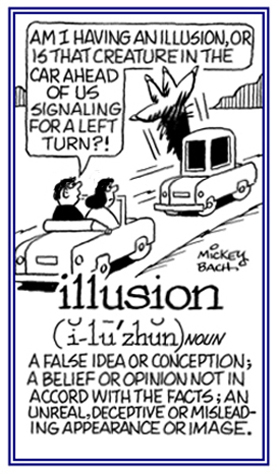You searched for:
“illusion”
1. A deception; a false, although often pleasant, notion; a misconception: The illusions of youth fade with maturity.
2. Semblance, a misleading visual impression; hallucination, false image: Mirrors give an illusion of more space in a room.
3. An imaginary appearance of something that seems to be real or which seems to exist: While he was sleeping, Sam had the illusion in his dream that he was a muscle man at a fitness studio and was so strong that the exercise equipment was breaking apart as he used each one.
4. The fact or condition of being deceived or fooled by appearances: A handsome face can be an illusion which disguises a mean personality.
5. A mental state involving the attribution of reality to what is unreal: Norbert was under the illusion that he was living in a castle as a king.

© ALL rights are reserved.
Go to this Word A Day Revisited Index
2. Semblance, a misleading visual impression; hallucination, false image: Mirrors give an illusion of more space in a room.
3. An imaginary appearance of something that seems to be real or which seems to exist: While he was sleeping, Sam had the illusion in his dream that he was a muscle man at a fitness studio and was so strong that the exercise equipment was breaking apart as he used each one.
4. The fact or condition of being deceived or fooled by appearances: A handsome face can be an illusion which disguises a mean personality.
5. A mental state involving the attribution of reality to what is unreal: Norbert was under the illusion that he was living in a castle as a king.
Troy had the illusion that his girlfriend was floating above his bed!
6. Etymology: "act of deception", from Old French illusion, "a mocking"; from Latin illusionem, illusio, "a mocking, a jesting, an irony"; from illudere, "to mock at"; literally, "to play with", from in-, "at" + ludere, "to play".A pleasant illusion is better than a harsh reality.

Go to this Word A Day Revisited Index
so you can see more of Mickey Bach's cartoons.
Word Entries containing the term:
“illusion”
gustatory illusion, taste illusion
An aberrant taste sensation; such as, dysgeusia (abnormal or impaired sense of taste), hypergeusia (abnormally sharp or acute sense of taste), and parageusia (disordered, hallucinatory, or abnormal sense of taste); also classified as a "chemosensory disorder".
This entry is located in the following unit:
gust-, gusti-
(page 2)
thermal grill illusion, TGI
Acute peripheral pain which is reduced by multisensory interactions at the spinal and brain levels.
British scientists have discovered that people experience far less pain when they touch a sore part of their body with their hand; so, a gentle rub may very well help pain go away, or at least decrease.
- The researchers investigated what is called the "thermal grill illusion" or TGI, where participants placed their index and ring fingers in warm water and the middle finger in cold water.
- With the TGI, or thermal grill illusion, the brain perceives the cool water as painfully hot.
- The study looked at heat perception after participants submerged their fingers in water of different temperatures and pressed their fingertips together in different combinations.
- This allowed scientists to study the experience of pain without actually causing any injury to those who participated in the studies.
- The scientists involved concluded that touching an apparently painful part of the body will affect the way pain signals travel to the brain.
- While touch may help an individual to cope with pain to some degree, perhaps by easing very mild pain from a minor injury, it is unlikely to completely eliminate the experience of pain.
- Pain is a very subjective experience, and many factors, including psychological and emotional factors, affect the way it is experienced.
This entry is located in the following unit:
thermo-, therm-, thermi-, -thermia, -therm, -thermal, -thermic, -thermias, -thermies, -thermous, -thermy
(page 20)
Word Entries at Get Words:
“illusion”
A misconception or false idea, not believable, or an opinion that is not real, but which is deceptive or misleading. (1)
This entry is located in the following unit:
Word a Day Revisited Index of Cartoons Illustrating the Meanings of Words
(page 43)
